Serb leader admits 'cleansing' crimes
Wartime Croatian Serb leader Milan Babic pleaded guilty today to persecution in a plan to ethnically cleanse parts of Croatia of non-Serbs at the outset of the Balkan wars, and expressed “a deep sense of shame” for his crimes.
In exchange for Babic’s guilty plea, prosecutors agreed to drop four other charges of war crimes.














